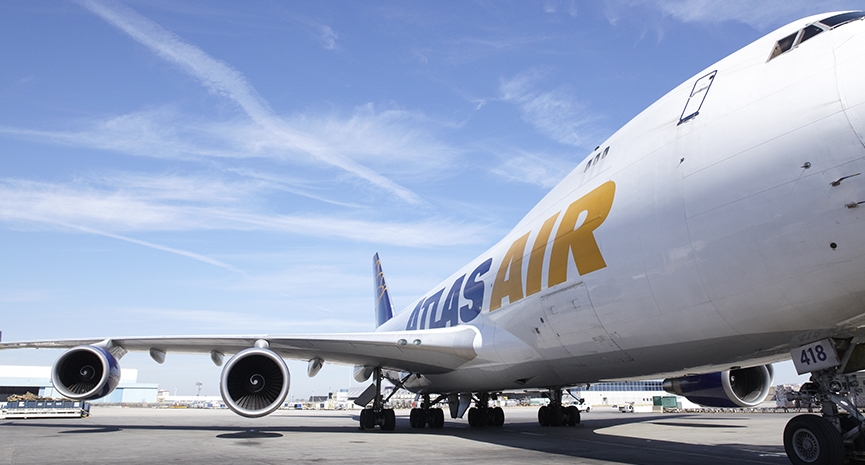Atlas Air turns focus to Asian air cargo market; raises full year guidance
Aviation - Atlas Air Worldwide Holdings, parent company of Atlas Air, Polar Air Cargo, Southern Air and Titan Aviation, reported a second-quarter 2017 net profit of $38.9 million, up 88.8 per cent over net income of $20.6 million last year.

August 03, 2017: Atlas Air Worldwide Holdings, parent company of Atlas Air, Polar Air Cargo, Southern Air and Titan Aviation, reported a second-quarter 2017 net profit of $38.9 million, up 88.8 per cent over net income of $20.6 million last year. The company said it is focused on growing its presence in Asia and ramping up its wet-lease flying for Amazon from six currently to an expected 20 by the end of 2018.
The company announced ACMI placement of three 747-400 freighters with Hong Kong Air Cargo Carrier Limited, a unit of Hong Kong airlines. The three aircraft will be operated by Atlas Air and will fly on behalf of Hong Kong air cargo. The first aircraft will enter service in September 2017 and will serve routes between Asia and United States while the second and third aircraft are expected to commence operation during 2018.
“We have entered into an ACMI agreement to operate three 747-400s for Hong Kong Air Cargo, the first of which will start flying in September. We have a strategic focus on the fast-growing Chinese and Asian markets, and we have added five new customers there this year,” said president and chief executive officer William J. Flynn.
“Earnings growth in the second quarter reflected a 17 per cent increase in revenue, 15 per cent increase in block hours, and higher direct contribution in all of our segments,” said Flynn. “Our growth also reflected an increase in aircraft utilization and a rise in commercial charter yields. During the quarter, we started flying for Cathay Pacific and Yangtze River Airlines and added four 767-300 freighters for Amazon, including our fifth and sixth aircraft in June.”
“We are experiencing good momentum in our business, and we expect that to carry through 2017, into 2018 and beyond. As a result, we are increasing our full-year 2017 outlook. We anticipate that our adjusted income from continuing operations, net of taxes, will grow by a percentage in the mid-teens this year, approximately double the midpoint of our previous outlook,” he added.
Atlas Air also continue to move more deeply into the faster-growing express and e-commerce markets. More than 70% of our current freighters operate for customers in these markets, and that percentage will increase as we ramp up from six aircraft for Amazon currently to an expected 20 by the end of 2018.
“The evolution of e-commerce is transforming the global supply chain and creating significant new opportunities for Atlas. Freighter aircraft in scaled route networks, such as those that we operate, provide the just-in-time service that enables consumers to receive their orders as quickly as possible.”
Meanwhile, higher charter segment contribution during the period was primarily due to improved commercial cargo yields, lower costs related to crew training, and an increase in commercial and military demand. These impacts were partially offset by higher heavy maintenance costs and lower rates paid by the military. Segment revenue growth was driven by an increase in block-hour volumes and average rates.
In Dry Leasing, higher revenue and segment contribution were primarily driven by the placement of six 767-300 converted freighter aircraft with Amazon between August 2016 and June 2017. Segment contribution also benefited from a reduction in interest expense due to the scheduled repayment of debt related to dry leased 777 aircraft in our portfolio.
Higher unallocated income and expenses in the second quarter of 2017 primarily reflected an increase in unallocated interest expense, growth initiatives, and amortization of a customer incentive asset, partially offset by an accrual for legal matters in the year-ago period.
Both reported and adjusted income from continuing operations in the second quarter of 2017 included a $2.7 million, or $0.10 per diluted share, benefit related to the timing of heavy maintenance that has moved to the third quarter of 2017 from the second quarter.
The carrier has increasing its outlook for the full year. “We expect our adjusted income from continuing operations, net of taxes, in 2017 to grow by a percentage in the mid-teens compared with 2016 adjusted income of $114.3 million, approximately double the midpoint of our prior view of mid-single-digit to low-double-digit percentage growth,” said Flynn.
“In addition, we expect adjusted income from continuing operations, net of taxes, in the third quarter of 2017 to increase by a percentage in the low- to mid-teens compared with our third-quarter 2016 adjusted income of $27.4 million,” he added.
“Given the inherent seasonality of airfreight demand, we anticipate that results in 2017 will reflect historical patterns, with more than 70 per cent of our adjusted income occurring in the second half. For the full year, we expect total block hours to increase approximately 20 per cent compared with 2016, with more than 75 per cent of our hours in ACMI and the balance in charter,” he said.
The carrier expects aircraft maintenance expense in 2017 to be approximately $255 million, and depreciation and amortization is anticipated at approximately $170 million. In addition, core capital expenditures, which exclude aircraft and engine purchases, are expected to total approximately $65 to $75 million, mainly for parts and components for its fleet.


